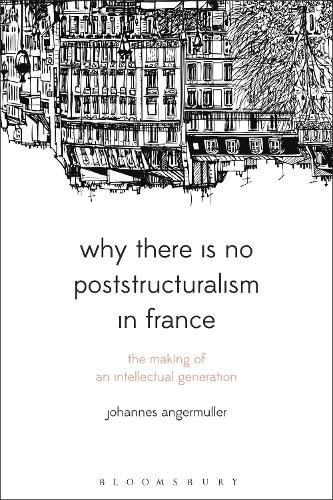
Why There Is No Poststructuralism in France: The Making of an Intellectual Generation
(Paperback)
Available Formats
Publishing Details
Why There Is No Poststructuralism in France: The Making of an Intellectual Generation
By (Author) Johannes Angermuller
Bloomsbury Publishing PLC
Bloomsbury Academic
26th July 2018
United Kingdom
Classifications
Tertiary Education
Non Fiction
Western philosophy from c 1800
Sociology
Linguistics
194
Physical Properties
Paperback
144
Width 156mm, Height 234mm
213g
Description
French thinkers such as Lacan and Derrida are often labelled as representatives of poststructuralism in the Anglophone world. However in France, where their work originated, they use no such category; this group of theorists the poststructuralists - were never perceived as a coherent intellectual group or movement. Outlining the institutional contexts, affinities, and rivalries of, among others, Althusser, Barthes, Foucault, Irigaray, and Kristeva, Angermuller drawing from Bourdieus concepts of cultural capital and the academic field insightfully explores post-structuralism as a phenomenon. By tracing the evolution of the French intellectual field after the war, Why There is No Poststructuralism in France places French Theory both in the specific material conditions of its production and the social and historical contexts of its reception, accounting for a particularly creative moment in French intellectual life which continues to inform the theoretical imaginary of our time.
Reviews
Angermuller is deft in cross-cutting between developments in French intellectual life and their often very partial, biased or distorted reception-history outside France. His shrewdly selective deployment of concepts from Bourdieu offers a number of striking insights into the formative conditions of (so-called) French Theory and its uptake among critics and commentators in other national/cultural traditions. It is certainly the most comprehensive and thoroughly researched study of its kind to date and unlikely to be superseded as a standard work on the subject. * Christopher Norris, Distinguished Research Professor of Philosophy, Cardiff University, UK *
Angermullers work offers illumination in a much-neglected field; it pertinently avoids simple reductivism by emphasizing a constitutive antagonism in the object of theory and society itself. * Hong Kong Review of Books *
Author Bio
Johannes Angermuller is Professor of Discourse and directs the DISCONEX research group at the university of Warwick, UK and at School for Advanced Studies in the Social Sciences (EHESS) in Paris, France.
